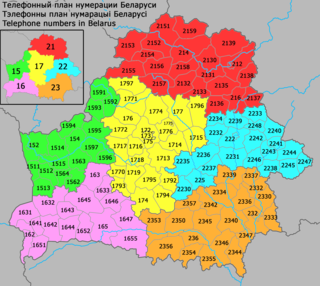Year 800 was a leap year starting on Wednesday of the Julian calendar.
800 may also refer to:

A blue box is an electronic device that produces tones used to generate the in-band signaling tones formerly used within the North American long-distance telephone network to send line status and called number information over voice circuits. This allowed an illicit user, referred to as a "phreaker", to place long-distance calls, without using the network's user facilities, that would be billed to another number or dismissed entirely as an incomplete call. A number of similar "color boxes" were also created to control other aspects of the phone network.

The North American Numbering Plan (NANP) is a telephone numbering plan for twenty-five regions in twenty countries, primarily in North America and the Caribbean. This group is historically known as World Zone 1 and has the telephone country code 1. Some North American countries, most notably Mexico, do not participate with the NANP.
A collect call in Canada and the United States, known as a reverse charge call in other parts of the English-speaking world, is a telephone call in which the calling party wants to place a call at the called party's expense.
A toll-free telephone number or freephone number is a telephone number that is billed for all arriving calls. For the calling party, a call to a toll-free number from a landline is free of charge. A toll-free number is identified by a dialing prefix similar to an area code. The specific service access varies by country.
In telecommunications, directory assistance or directory inquiries is a phone service used to find out a specific telephone number and/or address of a residence, business, or government entity.
In telecommunications, a long-distance call (U.S.) or trunk call is a telephone call made to a location outside a defined local calling area. Long-distance calls are typically charged a higher billing rate than local calls. The term is not necessarily synonymous with placing calls to another telephone area code.

The area code 868 is assigned to Trinidad and Tobago, a member of the North American Numbering Plan (NANP). The telephone numbering plan for the country is known as the National Numbering Plan. It is part of a system used for assigning telephone numbers in Trinidad and Tobago, and functions as a part of the North American Numbering Plan (NANP). It is regulated by the Telecommunications Authority of Trinidad and Tobago, which holds responsibility for telecommunications in the country.

Numbers on the Irish telephone numbering plan are regulated and assigned to operators by ComReg.

The dialling plan for mobile networks and new landline operators is closed; all subscriber numbers must be dialled in full. For landline numbers starting with 02, the dialling plan used to be open; the trunk digit and area code could be omitted if the caller was in the same area code as the callee. However, starting May 3, 2008, all landline numbers must be dialled in full.

The New Zealand telephone numbering plan describes the allocation of telephone numbers in New Zealand and the Pitcairn Islands.

Phonewords are mnemonic phrases represented as alphanumeric equivalents of a telephone number. In many countries, the digits on the telephone keypad also have letters assigned. By replacing the digits of a telephone number with the corresponding letters, it is sometimes possible to form a whole or partial word, an acronym, abbreviation, or some other alphanumeric combination.
GOOG-411 was a telephone service launched by Google in 2007, that provided a speech-recognition-based business directory search, and placed a call to the resulting number in the United States or Canada. The service was accessible a toll-free telephone number. It was an alternative to 4-1-1, an often-expensive service provided by local and long-distance phone companies, and was therefore commonly known as Google 411. This service was discontinued on November 12, 2010.
Telephone numbers in Canada follow the fixed-length format of the North American Numbering Plan (NANP) of a three-digit area code, a three-digit central office code, and a four-digit station or line code. This is represented as NPA NXX XXXX.
Country Code: +502
International Call Prefix: 00
National conventions for writing telephone numbers vary by country. The International Telecommunication Union (ITU) publishes a recommendation entitled Notation for national and international telephone numbers, e-mail addresses and Web addresses. Recommendation E.123 specifies the format of telephone numbers assigned to telephones and similar communication endpoints in national telephone numbering plans.
Country Code: +506

Belarus began using its own country code +375 in 1995, replacing the +7 international country code inherited from the Soviet Union. The local numbering plan was inherited from the Soviet Union and remains with few changes.
A misdialed call or wrong number is a telephone call or text message to an incorrect telephone number. This may occur because the number has been physically misdialed, the number is simply incorrect, or because the area code or ownership of the number has changed. In North America, toll-free numbers are a frequent source of wrong numbers because they often have a history of prior ownership. In the United Kingdom, many misdialed calls have been due to public confusion over the dialing codes for some areas.
Toll-free telephone numbers in the North American Numbering Plan have the area code prefix 800, 833, 844, 855, 866, 877, and 888. Additionally, area codes 822, 880 through 887, and 889 are reserved for toll-free use in the future. 811 is excluded because it is a special dialing code in the group NXX for various other purposes.